中学教材全解八年级英语
中学教材全解八年级英语下
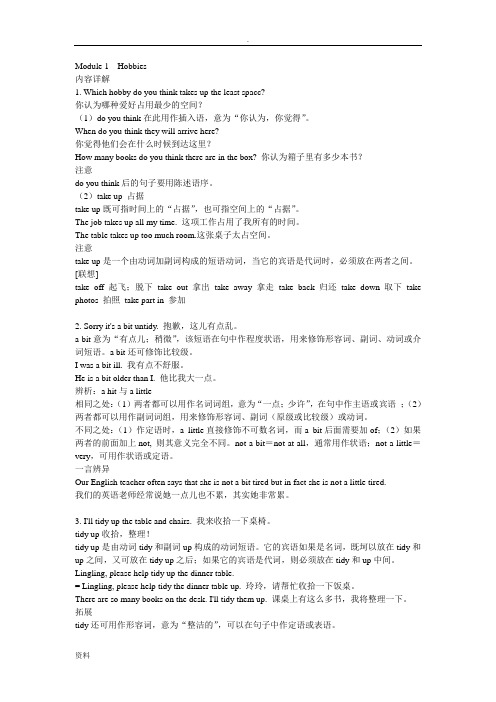
Module 1 Hobbies内容详解1. Which hobby do you think takes up the least spacc?你认为哪种爱好占用最少的空间?(1)do you think在此用作插入语,意为“你认为,你觉得”。
When do you think they will arrive here?你觉得他们会在什么时候到达这里?How many books do you think there are in the box? 你认为箱子里有多少本书?注意do you think后的句子要用陈述语序。
(2)take up 占据take up既可指时间上的“占据”,也可指空间上的“占据”。
The job takes up all my time. 这项工作占用了我所有的时间。
The table takes up too much room.这张桌子太占空间。
注意take up是一个由动词加副词构成的短语动词,当它的宾语是代词时,必须放在两者之间。
[联想]take off 起飞;脱下take out 拿出take away 拿走take back 归还take down 取下take photos 拍照take part in 参加2. Sorry it's a bit untidy. 抱歉,这儿有点乱。
a bit意为“有点儿;稍微”,该短语在句中作程度状语,用来修饰形容词、副词、动词或介词短语。
a bit还可修饰比较级。
I was a bit ill. 我有点不舒服。
He is a bit older than I. 他比我大一点。
辨析:a hit与a little相同之处:(1)两者都可以用作名词词组,意为“一点;少许”,在句中作主语或宾语;(2)两者都可以用作副词词组,用来修饰形容词、副词(原级或比较级)或动词。
不同之处:(1)作定语时,a little直接修饰不可数名词,而a bit后面需要加of;(2)如果两者的前面加上not, 则其意义完全不同。
中学教材全解八年级英语(上)
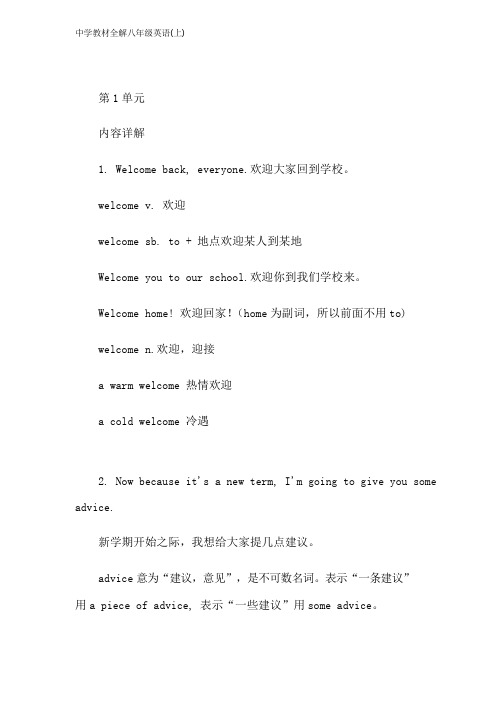
第1单元内容详解1.Welcome back,everyone.欢迎大家回到学校。
welcome v.欢迎welcome sb.to+地点欢迎某人到某地Welcome you to our school.欢迎你到我们学校来。
Welcome home!欢迎回家!(home为副词,所以前面不用to)welcome n.欢迎,迎接a warm welcome热情欢迎a cold welcome冷遇2.Now because it's a new term,I'm going to give you some advice.新学期开始之际,我想给大家提几点建议。
advice意为“建议,意见”,是不可数名词。
表示“一条建议”用a piece of advice,表示“一些建议”用some advice。
I'll give you some advice on how to look after your pet dog.我将给你一些怎样照顾你的宠物狗的建议。
[搭配]—give sb.some advice/give some advice to sb.给某人提一些建议ask for advice征求意见follow/take sb.’s advice接受某人的建议7.拓展advise是动词,意为“建议”,后接名词、代词或动名词作宾语,也可用于advisesb.(not)to do sth.结构,意为“建议某人(不要)做某事”。
She advised us to wait(for)one more day.她建议我们再等一天。
3.Why don't you write it down?你们为何不把它记下来呢?(1)Why don't you do…?是英语中一个重要的句型,意为“你(们)为什么不做事呢?”,多用来向对方提出建议。
该句型还可简化为“Why not do…?”。
八年级下册英语人教版中学教材全解

八年级下册英语人教版中学教材全解Eight Grade English textbook is a crucial part of the middle school curriculum, providing students with the necessary skills and knowledge to excel in the language. The series covers a wide range of topics, from grammar and vocabulary to reading and writing exercises. In this document, we will provide a comprehensive guide to the entire content of the Eight Grade English textbook.Unit 1: FriendsThis unit focuses on developing communication skills with friends and classmates. Students learn how to introduce themselves, talk about their hobbies and interests, and discuss plans and arrangements. The unit also covers the use of present simple and present continuous tenses.Unit 2: Stories and LegendsIn this unit, students explore various types of stories and legends, from folk tales to myths and legends. They learn how to retell and summarize stories, identify main ideas, and analyze characters and settings.Unit 3: The MediaUnit 3 discusses the role of the media in society, including newspapers, magazines, TV shows, and social media. Students learn how to express opinions, discuss current events, and write a news report.Unit 4: HeroesThis unit focuses on famous heroes and role models, such as historical figures, celebrities, and everyday heroes. Students learn how to describe people, talk about their achievements, and discuss their qualities.Unit 5: TravelUnit 5 explores the topic of travel, including different modes of transportation, travel destinations, and cultural experiences. Students learn how to make travel plans, ask for directions, and write a travel guide.Unit 6: EnvironmentIn this unit, students learn about environmental issues and how to protect the planet. They discuss pollution, climate change, and conservation efforts, and learn how to express concerns and suggestions.Unit 7: TechnologyUnit 7 discusses the impact of technology on society, including the Internet, smartphones, and social media. Students learn how to use technology responsibly, discuss its advantages and disadvantages, and write a blog post.Unit 8: Health and WellbeingThis unit covers topics related to health and wellbeing, such as exercise, nutrition, and mental health. Students learn how to talk about healthy habits, give advice, and write a health and fitness plan.Overall, the Eight Grade English textbook provides a comprehensive and engaging curriculum that prepares students for success in the language. By mastering the skills and knowledge covered in this textbook, students will bewell-equipped to communicate effectively in English and achieve their academic goals.。
中学教材全解 八年级英语下 外语教研版 教材听力原文译文
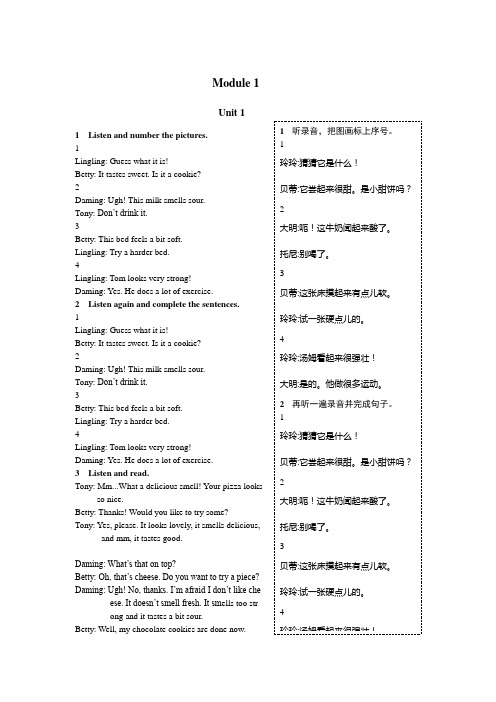
Module 1 Unit 11Listen and number the pictures.1Lingling: Guess what it is!Betty: It tastes sweet. Is it a cookie?2Daming: Ugh! This milk smells sour.Tony: Don’t drink it.3Betty: This bed feels a bit soft.Lingling: Try a harder bed.4Lingling: Tom looks very strong!Daming: Yes. He does a lot of exercise.2Listen again and complete the sentences.1Lingling: Guess what it is!Betty: It tastes sweet. Is it a cookie?2Daming: Ugh! This milk smells sour.Tony: Don’t drink it.3Betty: This bed feels a bit soft.Lingling: Try a harder bed.4Lingling: Tom looks very strong!Daming: Yes. He does a lot of exercise.3Listen and read.Tony: Mm...What a delicious smell! Your pizza looks so nice.Betty: Thanks! Would you like to try some?Tony: Yes, please. It looks lovely, it smells delicious, and mm, it tastes good.Daming: What’s that on top?Betty: Oh, that’s cheese. Do you want to try a piece? Daming: Ugh! No, thanks. I’m afraid I don’t like che- ese. It doesn’t smell fresh. It sm ells too str-ong and it tastes a bit sour.Betty: Well, my chocolate cookies are done now. 1听录音,把图画标上序号。
(中学教材全解)2013-2014学年八年级英语上册 Unit 7 Would you mind t
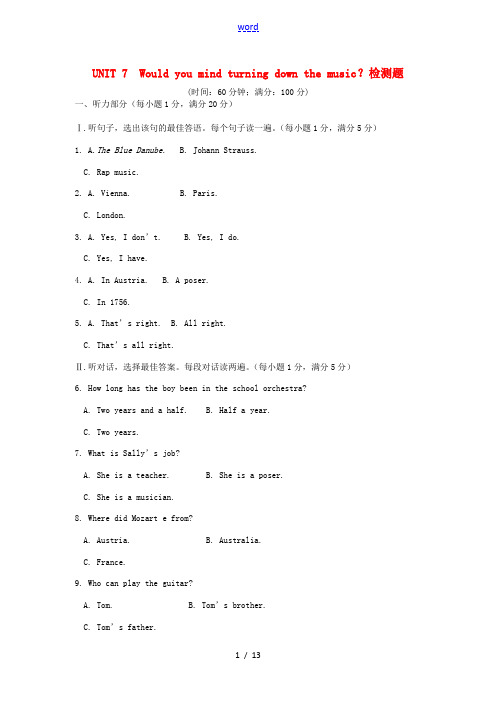
“Oh, it’s too expensive!”
Ten minutes35, they see Henry’s sister, Lily, ing36her bicycle. They decide to ask Lily for37.
A. Tom.B. Tom’s brother.
C. Tom’s father.
10. What dose Jack’s father like?
A. Pop music.B. Beijing Opera.
C. Classical music.
Ⅲ.听对话,选择最佳答案。每段对话读两遍。(每小题1分,满分5分)
C.Seventeen.
15.What do Simon and Daniel both like doing?
A.Swimming. B.Playing tennis.
C.Climbing.
Ⅳ.听短文,选择最佳答案。短文读两遍。(每小题1分,满分5分)
16. Steven King wants to have a_______.
“Buy him a puter game.”
Mike and Betty38think it’s a good idea. They go into a shop and the shopkeeper tells them one puter game is the39puter game this year. So they buy it. However, Henry doesn’t like it. Why? Henry knows40about puter games.
听第一段对话,回答第11至12小题。
【中学教材全解】2021-2022学年八年级英语(下)(人教版)UNIT 8 Have you re
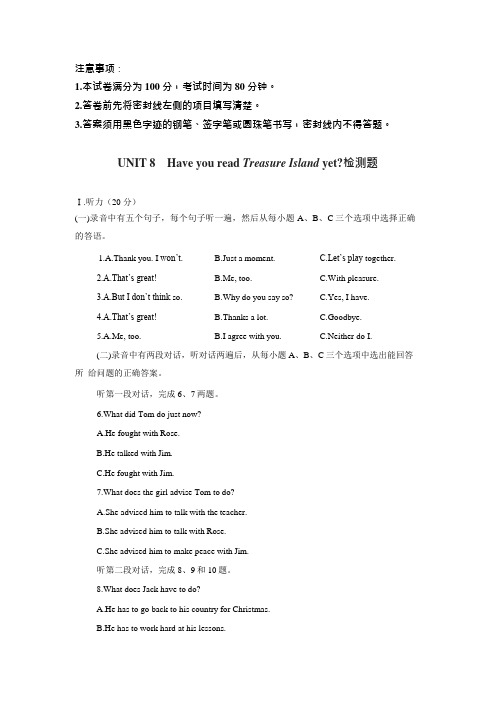
注意事项:1.本试卷满分为100 分,考试时间为80 分钟。
2.答卷前先将密封线左侧的项目填写清楚。
3.答案须用黑色字迹的钢笔、签字笔或圆珠笔书写,密封线内不得答题。
UNIT 8 Have you read Treasure Island yet?检测题Ⅰ.听力(20 分)(一)录音中有五个句子,每个句子听一遍,然后从每小题A、B、C三个选项中选择正确的答语。
1.A.Thank you. I won’t. B.Just a moment. C.Let’s play together.2.A.That’s great! B.Me, too. C.With pleasure.3.A.But I don’t think so. B.Why do you say so? C.Yes, I have.4.A.That’s great! B.Thanks a lot. C.Goodbye.5.A.Me, too. B.I agree with you. C.Neither do I.(二)录音中有两段对话,听对话两遍后,从每小题A、B、C三个选项中选出能回答所给问题的正确答案。
听第一段对话,完成6、7两题。
6.W hat did Tom do just now?A.He fought with Rose.B.He talked with Jim.C.He fought with Jim.7.W hat does the girl advise Tom to do?A.She advised him to talk with the teacher.B.She advised him to talk with Rose.C.She advised him to make peace with Jim.听第二段对话,完成8、9和10题。
8.What does Jack have to do?A.He has to go back to his country for Christmas.B.He has to work hard at his lessons.C.He has to have the exams before Christmas.9.Where does Jack come from?A.A m erica.B.England.C.Canada.10.When will he have the exams?A.B e fore Christmas.B.In December.C.In January.(三)录音中有一篇短文,听短文两遍,根据你所听到的内容判断句子正(T)误(F)。
八年级英语(上册)中学教材全解
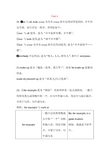
Unit 420. ❶not与all, both, every及含有every的不定代词等连用时,并不否定全部,而只否定一部分,其用法如下:①not 与all连用,意为“并不是所有都;并不都”。
②not 与both连用,意为“两个并不都”。
③not 与every及含有every的不定代词连用,意为“并不是每个……都”。
❷everbody不定代词,意为“每人;人人;所有人”,相当于everyone。
21.make up意为“编造(故事、谎言等)”,此处be made up是被动语态。
make sb./oneself up意为“给某人/自己化妆”。
22.①for example意为“例如”,用来列举某一论点或情况,一般只列举同类人或事物中的一个,在句中作插入语,用逗号与前后隔开,可用于句首、句中或句末。
辨析:for example与such as②poor形容词,意为“贫穷的;贫困的”,反义词为rich。
23.take...seriously意为“认真对待……,把……当真”,其中seriously 是serious的副词形式,意为“严重地;严肃地;认真地”。
24.give及物动词,意为“提供;给”,过去式为gave。
give sb. sth. =give sth. to sb.,意为“把某物给某人”。
和give类似,能接双宾语的动词还有:bring(带来);teach(教);show(给……看);tell(告诉)等。
此类动词的常用结构为:动词+sb.(间接宾语)+sth.(直接宾语)=动词+sth.(直接宾语)+to sb.(间接宾语)。
e true是不及物动词短语,意为“(梦想、希望等)实现,达到”26.crowded形容词,意为“人多的;拥挤的;挤满的”,反义词为uncrowded。
27.one of... 意为“……之一”,后面接名词或代词的复数形式;“one of the+形容词的最高级+可数名词的复数形式”意为“最……的……之一”。
中学教材全解八年级英语上

中学教材全解八年级英语上Document number【980KGB-6898YT-769T8CB-246UT-18GG08】Module 1 How to learn English第1单元内容详解1. Welcome back, everyone.欢迎大家回到学校。
welcome v. 欢迎welcome sb. to + 地点欢迎某人到某地Welcome you to our school.欢迎你到我们学校来。
Welcome home! 欢迎回家!(home为副词,所以前面不用to)welcome n.欢迎,迎接a warm welcome 热情欢迎a cold welcome 冷遇2. Now because it's a new term, I'm going to give you some advice.新学期开始之际,我想给大家提几点建议。
advice意为“建议,意见”,是不可数名词。
表示“一条建议”用a piece of advice, 表示“一些建议”用some advice。
I'll give you some advice on how to look after your pet dog.我将给你一些怎样照顾你的宠物狗的建议。
[搭配] —give sb. some advice / give some advice to sb. 给某人提一些建议ask for advice 征求意见follow / take sb.’ s advice 接受某人的建议7. 拓展advise是动词,意为“建议”,后接名词、代词或动名词作宾语,也可用于advisesb. (not) to do sth.结构,意为“建议某人(不要)做某事”。
She advised us to wait (for) one more day. 她建议我们再等一天。
3. Why don't you write it down 你们为何不把它记下来呢(1)Why don't you do…是英语中一个重要的句型,意为“你(们)为什么不做事呢”,多用来向对方提出建议。
- 1、下载文档前请自行甄别文档内容的完整性,平台不提供额外的编辑、内容补充、找答案等附加服务。
- 2、"仅部分预览"的文档,不可在线预览部分如存在完整性等问题,可反馈申请退款(可完整预览的文档不适用该条件!)。
- 3、如文档侵犯您的权益,请联系客服反馈,我们会尽快为您处理(人工客服工作时间:9:00-18:30)。
中学教材全解八年级英语(下)Module 1 Hobbies内容详解1. Which hobby do you think takes up the least spacc?你认为哪种爱好占用最少的空间?(1)do you think在此用作插入语,意为“你认为,你觉得”。
When do you think they will arrive here?你觉得他们会在什么时候到达这里?How many books do you think there are in the box? 你认为箱子里有多少本书?注意do you think后的句子要用陈述语序。
(2)take up 占据take up既可指时间上的“占据”,也可指空间上的“占据”。
The job takes up all my time. 这项工作占用了我所有的时间。
The table takes up too much room.这张桌子太占空间。
注意take up是一个由动词加副词构成的短语动词,当它的宾语是代词时,必须放在两者之间。
[联想]take off 起飞;脱下take out 拿出take away 拿走take back 归还take down 取下take photos 拍照take part in 参加2. Sorry it's a bit untidy. 抱歉,这儿有点乱。
a bit意为“有点儿;稍微”,该短语在句中作程度状语,用来修饰形容词、副词、动词或介词短语。
a bit还可修饰比较级。
I was a bit ill. 我有点不舒服。
He is a bit older than I. 他比我大一点。
辨析:a hit与a little相同之处:(1)两者都可以用作名词词组,意为“一点;少许”,在句中作主语或宾语;(2)两者都可以用作副词词组,用来修饰形容词、副词(原级或比较级)或动词。
不同之处:(1)作定语时,a little直接修饰不可数名词,而a bit 后面需要加of;(2)如果两者的前面加上not, 则其意义完全不同。
not a bit=not at all,通常用作状语;not a little=very,可用作状语或定语。
一言辨异Our English teacher often says that she is not a bit tired but in fact she is not a littletired.我们的英语老师经常说她一点儿也不累,其实她非常累。
3. I'll tidy up the table and chairs. 我来收拾一下桌椅。
tidy up收拾,整理!tidy up是由动词tidy和副词up构成的动词短语。
它的宾语如果是名词,既坷以放在tidy和up之间,又可放在tidy up之后;如果它的宾语是代词,则必须放在tidy和up中间。
Lingling,please help tidy up the dinner table.= Lingling, please help tidy the dinner table up. 玲玲,请帮忙收拾一下饭桌。
There are so many books on the desk. I'll tidy them up. 课桌上有这么多书,我将整理一下。
拓展tidy还可用作形容词,意为“整洁的”,可以在句子中作定语或表语。
tidy的反义词是untidy,意为“不整洁的”。
You have a tidy / untidy bedroom.你们有一间整洁的/不整吉的卧室。
Their sitting room is very tidy/untidy. 他们的客厅非常整洁/不整洁。
4. You've got a wonderful collection. 你的收藏太棒了。
(1)have / has got是口语中常用的一个词组,意为“有”,相当于have或has。
I have got a new pen pal from the United States. 我有一位来自美国的新笔友。
He has got a lovely dog. 他有一只可爱的小狗。
温馨提示(1)have / has got与have / has尽管含义相同,但从时态上看,前者是现在完成时,后者是一般现在时,故构成疑问句和否定句时应注意区别对待。
Have you got a new radio? Do you have a new radio?你有一台新收音机吗?(2)collection是名词,意为“收集;收藏品”。
collector也是一个名词,意为“收藏家;收藏者”。
collect是动词,意为“收集”。
She made a collection of coins. 她收集硬币。
He wants to be a great collector. 他想成为一名伟大的收藏家。
拓展①v.+ -ion构成的名词act +-ion—action 行动invent+-ion—invention 发明direct +-ion—direction 方向impress +-ion—impression 印象express+-ion—expression 表达discuss+-ion—discussion 讨论②collect 或have a collection of 用来表示“收集……”。
有类似用法的词还有rest和look等。
Rest / have a rest 休息look / have a look at... 看……5. I play the violin and I listen to music all the time. 我一直拉小提琴和听音乐。
all the time意为“总是,一直”,在句中作时间状语。
The little girl was laughing all the time. 那个小女孩一直笑个不停。
[联想]on time 准吋in time 及时at times 有时from time to time 不时.6. What made you so interested in music? 是什么让你对音乐如此感兴趣?(1)make + sb. + adj. 使某人……,形容词在句中作宾语补足语。
Her words made me very happy. 她的话让我很开心。
(2)(be) interested in 对……感兴趣Be / get / become interested in的主语往往是人,常常表示“某人对某事产生兴趣”。
in在这里是一个介词,后面可以跟名词、代词或动词的-ing形式。
Almost all the children are interested in storybooks.几乎所有的孩子都对故事书感兴趣。
I became interested in making things last year.去年我对制作东西产生了兴趣。
辨析:interested与interestingInterested 为表语形容词,只作表语,不作定语,表示人的状态。
Interesting 既可作表语也可作定语,修饰名词或代词,表示事物的特征或性质。
一言辨异The students in Class Two are all interested in this interesting story.二班的学生都对这个有趣的故事感兴趣。
7. I often listened to him play the violin. 我过去经常听他拉小提琴。
(1)listen to,see,hear,watch等感官动词后可以接省to的动词不定式,作宾语补足语,表示经常性的动作或全过程,还可跟v. -ing 形式。
一感(feel)二听(hear, listen to)三让(make, let,have)四看(look at,see,watch, notice)I hear a girl sing English songs in the next door every morning.我每天早晨听到一个女孩在隔壁唱英文歌。
(2)play后接西洋乐器名词时,名词前加定冠词the;后接球类名词时,名词前不加任何冠词。
The little girl is playing the piano. 这个小女孩正在弹钢琴。
He likes playing basketball.他喜欢打篮球。
中考链接She learned to play ______ piano all by herself.A. aB. anC. theD. /解析:当play后接西洋乐器时要加定冠词the。
play the piano意为“弹钢琴”8. And he gave me my first violin eight years ago. 八年前,他送给我第一把小提琴。
give sb. sth. 相当于give sth. to sb.. 意思为“给某人某物”。
当sth.是代词的宾格时,只能用give sth. to sb…类似give能接双宾语的动词还有:pass,lend,Show等。
I gave the boy a book. ( = 1 gave a book to the boy.) 我给了那个男孩一本书。
9. There's a concert at Radio Beijing. 北京电台有一场音乐会。
这是there be结构,它表示“在某地方(或某事)存在什么人或物”,指客观存在。
动词be与后面相邻的名词在数上保持一致,即“就近原则”。
There be结构与实义动词have不同,前者表“存在”,后者表“所有”。
There is an apple tree in the garden. 花园里有一棵苹果树。
There are some apple trees in the garden.花园里有一些苹果树。
They have some apple trees in the garden. 他们在花园里有一些苹果树。
10. I'm going to school with you! 我要和你们一起去上学啊!本句是用现在进行时态表示将来,表示根据安排将要做某事,人作主语宜用现在时态。
I'm not going out this evening. 今晚我不准备出去。
温馨提示现在进行时表示将来,主要用于go,come,leave,start等表示去向的短暂性动词。
I'm leaving tomorrow.明天我要走了。
